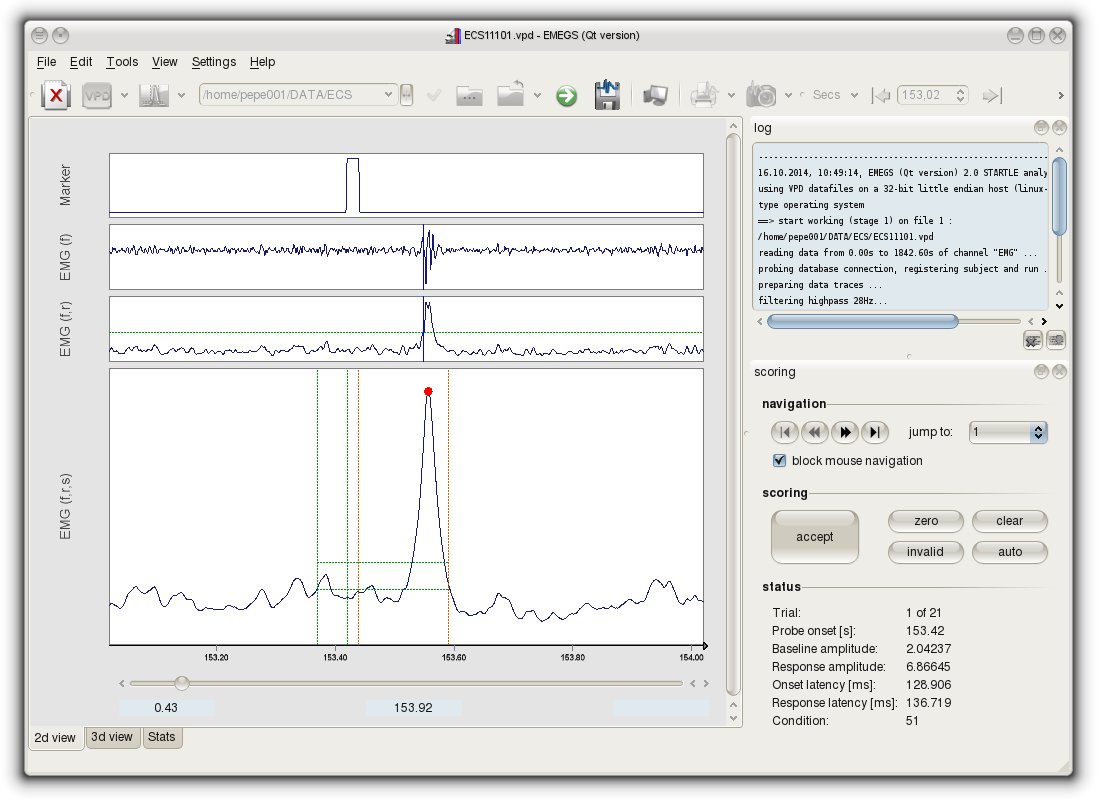

Reflexive startle myography is concerned with quantifying the
strength of a startle reaction by measuring the activity of the
muscle responsible for closing the eyelid (orbicularis oculi
muscle) and calculating the strength of stimulus evoked responses.
For the analysis in EMEGS, it is irrelevant how startle reactions
were elicited, it is however crucial to know when the eliciting
stimuli were delivered.
Preparation
Before running a STARTLE analysis, the onset of the startle
probes must be made available in a timing-file or in the database
with the corresponding tag specified on the STARTLE
configuration page of the Configure-Study-Dialog (shown below).
The tag used in the example below reads startle, but can
be chosen arbitrarily when running the MARKER analysis, provided that
the selected tag name matches the tag name in the STARTLE
configuration.
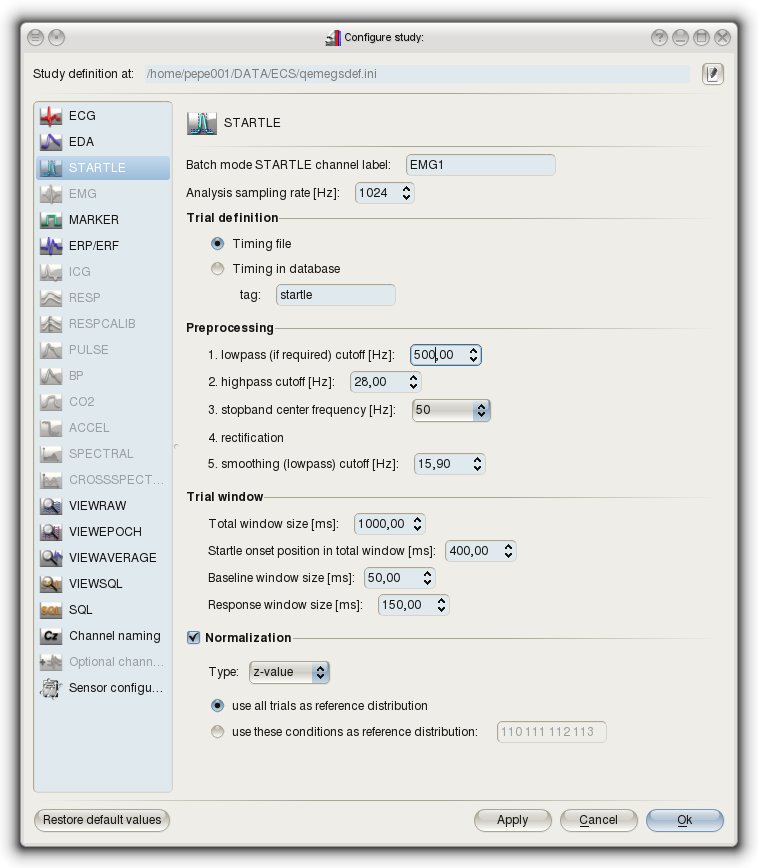
A timing-file compatible with the settings shown above could look
like this: it has a subsection tagged startle and this
subsection contains only the onsets of startle probes. Other
stimuli (in this case pictures used as background stimuli in the
subsection tagged eda) should be excluded from the startle
subsection.
Condition
Start End
Duration SegmentNr
ConditionNr
eda:
11 129.4570312
137.4824219 8.0253907
1 1
21 146.3925781
153.4179688 7.0253907
2 1
31 162.8886719
170.9140625 8.0253906
3 1
31 190.9746094
198.9902344 8.015625
4 2
...
startle:
51 153.4199219
153.5175781 0.09765625
1 1
51 215.5566406
215.6542969 0.09765625
2 2
61 250.8378906
250.9375
0.099609375 3 1
41 285.359375
285.4589844 0.099609375
4 1
51 318.1699219
318.2675781 0.09765625
5 3
41 350.9902344
351.0878906 0.09765625
6 2
61 402.0664062
402.1640625 0.09765625
7 2
61 459.859375
459.9570312 0.09765625
8 3
...
Startle analysis
Once the timing information has been prepared, you can start the
STARTLE analysis by clicking on the "Open datafile"-button and
select the raw datafile to analyze. EMEGS will display the import
signals dialog as usual ...
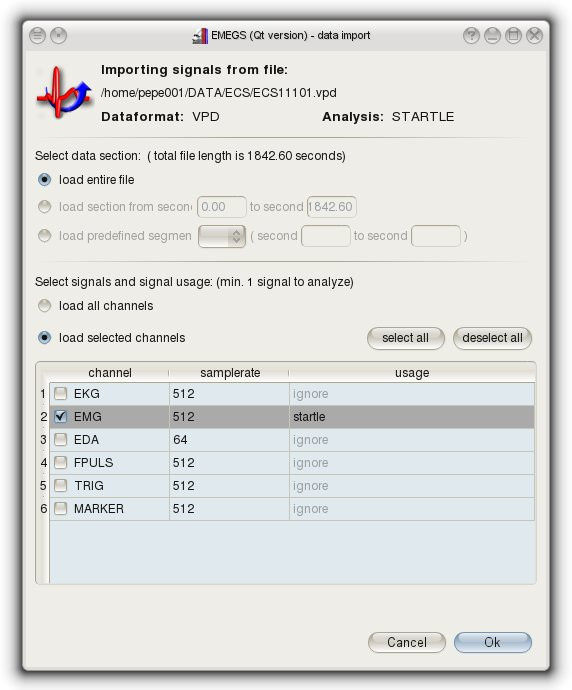
In this case, data was collected at a sampling rate of 512 Hz,
which is not optimal (bacause too low) for the STARTLE analysis
(this was due to a limitation of the portable measuring device,
which just can't go any faster).
EMEGS will then load the data and preprocess it according to the
STARTLE configuration. You can adjust the lowpass and highpass
cut-off frequencies and the stop-band center frequency according
to your needs, but you must do so before starting the analysis.
The progress of the preprocessing is shown on the log docking
widget.
After preprocessing, startle trials are displayed for manual
scoring. The topmost signal is a visualization of the probe onset
marker (at the rising flank), the second ist the filtered EMG
signal before rectification, the third is the EMG signal after
rectification with just a little bit of smoothing, the fourth
signal is the rectified and smoothed signal used for amplitude
scoring. Signals 2 and 3 are used for response onset detection
with the vertical blue line at the recognized onset. Signal 4 has
a red circle at the recognized response maximum. The vertical
green lines mark the baseline window, which comprises the 50ms
before probe onset by default. The horizontal green lines
illustrate the mean baseline level (lower line) and the response
threshold (upper line), which is at the mean baseline level plus
three standard deviations.
For each trial, the baseline and response windows can be adjusted, and the response onset and maximum can be reset manually in the data window by drag-and-drop of the corresponding graphical markers. Responses with amplitudes below the response threshold should in most cases be scored as ZERO responses, whereas responses with a blink in the baseline window should be scored as INVALID. If the signal during the baseline window is not a blink but is generally noisy or artefactually distorted, the baseline window should be adjusted
On the scoring docking widget, the current trial can be scored as
"good" using the ACCEPT-button, as a "null" response using the
ZERO-button, or as "invalid" using the INVALID-button. Each of
these decision will move the scoring window automatically to the
next trial. Below these buttons, the status of the current trial
is displayed, including the total number of trials and the current
trial condition. You can navigate backward or forward without
making any scoring decision using the navigation section above, or
the "jump to"-dropdown-box.

Once you've finished editing, click on the "Resume
analysis"-button to save the results in the database.
You can save the results at an earlier stage using the "Save
edited data"-button, and restart the analysis later on to resume
the editing (not supported yet).
Value export
To export the results from the database:
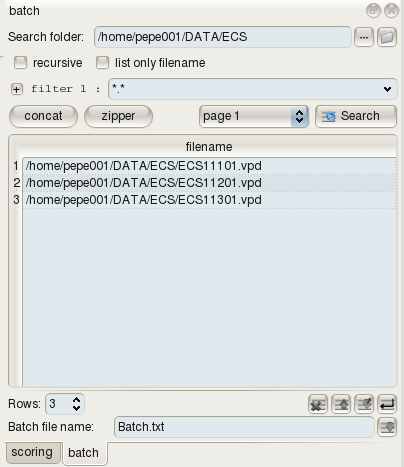
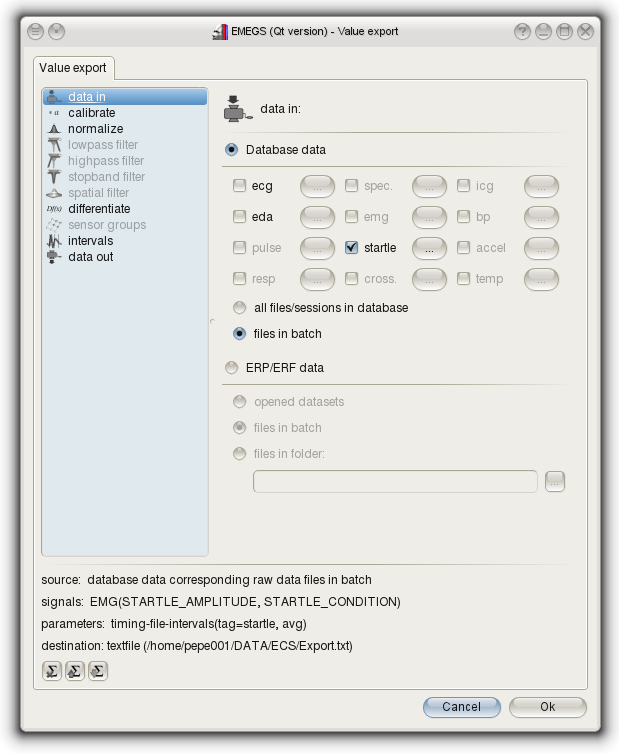
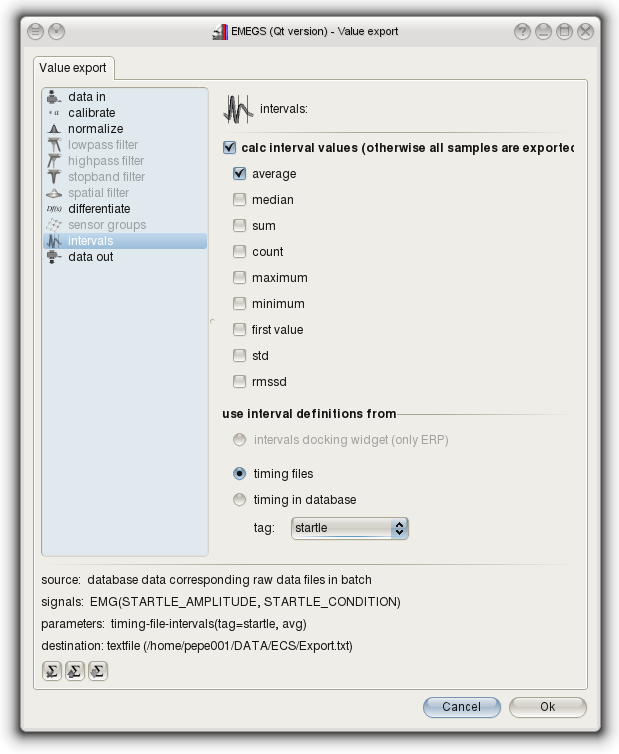
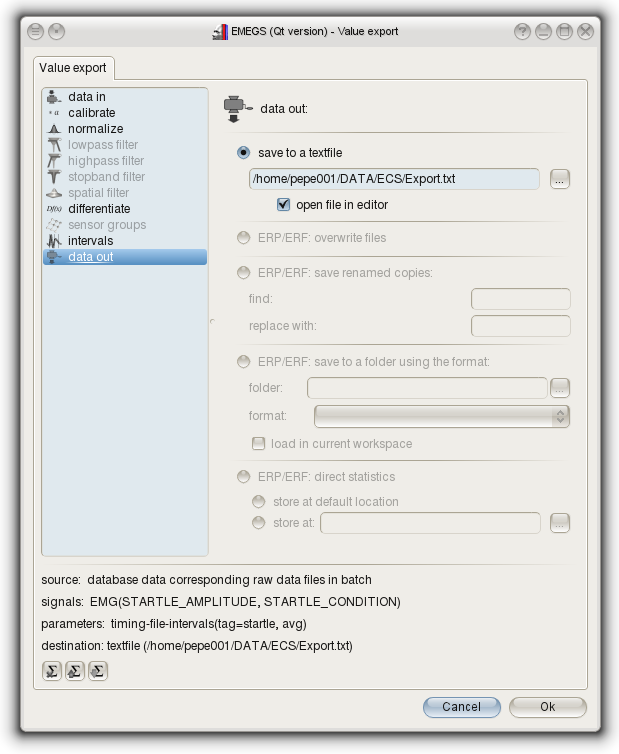
Subject
Session SegmentNr
Condition ConditionRepeat
SourceChannel Parameter
SignalName Data
111 1
1 51 1
EMG avg
STARTLE_AMPLITUDE 6.86645
111 1
1 51 2
EMG avg
STARTLE_CONDITION 51
111 1
2 51 3
EMG avg
STARTLE_AMPLITUDE 1.83838
111 1
2 51 4
EMG avg
STARTLE_CONDITION 51
111 1
3 61 1
EMG avg
STARTLE_AMPLITUDE 2.85668
111 1
3 61 2
EMG avg
STARTLE_CONDITION 61
111 1
4 41 1
EMG avg
STARTLE_AMPLITUDE 6.88834
111 1
4 41 2
EMG avg
STARTLE_CONDITION 41
111 1
5 51 5
EMG avg
STARTLE_AMPLITUDE 0.816156
111 1
5 51 6
EMG avg
STARTLE_CONDITION 51
111 1
6 41 3
EMG avg
STARTLE_AMPLITUDE 0.34446
111 1
6 41 4
EMG avg
STARTLE_CONDITION 41
111 1
7 61 3
EMG avg
STARTLE_AMPLITUDE 5.34824
111 1
7 61 4
EMG avg
STARTLE_CONDITION 61
111 1
8 61 5
EMG avg
STARTLE_AMPLITUDE 0.855559
111 1
8 61 6
EMG avg
STARTLE_CONDITION 61
111 1
9 41 5
EMG avg
STARTLE_AMPLITUDE 13.5139
111 1
9 41 6
EMG avg
STARTLE_CONDITION 41
111 1 10
42 1 EMG
avg STARTLE_AMPLITUDE
0.184871
111 1 10
42 2 EMG
avg STARTLE_CONDITION 42
111 1 11
52 1 EMG
avg STARTLE_AMPLITUDE
5.12117
111 1 11
52 2 EMG
avg STARTLE_CONDITION 52
111 1 12
52 3 EMG
avg STARTLE_AMPLITUDE
0.702276
111 1 12
52 4 EMG
avg STARTLE_CONDITION 52
111 1 13
42 3 EMG
avg STARTLE_AMPLITUDE
0.602816
111 1 13
42 4 EMG
avg STARTLE_CONDITION 42
111 1 14
62 1 EMG
avg STARTLE_AMPLITUDE
0.966428
111 1 14
62 2 EMG
avg STARTLE_CONDITION 62
111 1 15
62 3 EMG
avg STARTLE_AMPLITUDE
-0.135723
111 1 15
62 4 EMG
avg STARTLE_CONDITION 62
111 1 16
43 1 EMG
avg STARTLE_AMPLITUDE
0.194199
111 1 16
43 2 EMG
avg STARTLE_CONDITION 43
111 1 17
53 1 EMG
avg STARTLE_AMPLITUDE
0.591396
...